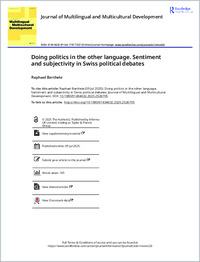Doing politics in the other language. Sentiment and subjectivity in Swiss political debates
BLE-BLL
- Berthele, Raphael ORCID University of Fribourg
- 2025
Published in:
- Journal of Multilingual and Multicultural Development. - 2025, p. 1-18
Foreign language effect
Language and politics
Bilingualism
Political polarisation
Natural language processing
Sentiment analysis
Discourse analysis
English
Experimental research on decision making and moral dilemmas shows effects of using a second or foreign language on cognition: People tend to apply different rationalities and are less biased when thinking and solving tasks in the L2. In this contribution, the manifestations of a foreign language effect are investigated in naturally occurring spoken language data in a specific domain (politics). While some scholars have hypothesised that a possible foreign language effect could be relevant for multilingual political institutions (such as the administration of the European Union), so far, no quantitative research has been done to test the hypothesis.
To fill this gap, the conversational turns of 10 Swiss politicians who appear both in French – and German-speaking national TV are analysed. A total of 2100 turns in their respective L1 or L2 are submitted to sentiment and subjectivity analyses using Natural Language Processing tools. The analyses show that politicians tend to be less negative and less subjective in their respective L2. The data suggest that the use of L2s may indeed have an influence on the interactional quality of political debates.
To fill this gap, the conversational turns of 10 Swiss politicians who appear both in French – and German-speaking national TV are analysed. A total of 2100 turns in their respective L1 or L2 are submitted to sentiment and subjectivity analyses using Natural Language Processing tools. The analyses show that politicians tend to be less negative and less subjective in their respective L2. The data suggest that the use of L2s may indeed have an influence on the interactional quality of political debates.
- Faculty
- Faculté des lettres et des sciences humaines
- Department
- Département de plurilinguisme et didactique des langues étrangères
- Language
-
- English
- Classification
- Language, linguistics
- License
- Open access status
- hybrid
- Identifiers
-
- DOI 10.1080/01434632.2025.2526705
- ISSN 0143-4632
- Persistent URL
- https://folia.unifr.ch/unifr/documents/332384
Statistics
Document views: 198
File downloads:
- berthele_doing_2025: 66
